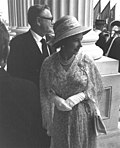| ||
|---|---|---|
Term of government (1972–1975)
Ministries Elections Related |
||
The Palace letters, sometimes labelled as the Palace papers, were letters between Queen Elizabeth II, through her Private Secretary Martin Charteris, and Australian Governor-General Sir John Kerr around the time of the 1975 constitutional crisis, in which Kerr dismissed Australian Prime Minister Gough Whitlam.[1] The phrase 'Palace letters' originated in the work of Australian historian and Whitlam biographer Professor Jenny Hocking, who successfully overturned the Queen's embargo over these letters, as a reference to Buckingham Palace, the official residence of Elizabeth in London.[2]
Kerr's copies of these letters are held by the National Archives of Australia, which would ordinarily have made them publicly accessible after 30 years as provided by the Archives Act. However, the letters arrived at the Archives as a voluntary deposit of personal papers and access was therefore subject to terms set down by Kerr, which meant that public access was denied according to an embargo placed over them by the Queen until at least 2027 and after that date until permitted by the Queen's private secretary.
In 2016, Professor Jenny Hocking, having been refused access to the letters, sued the National Archives for their release, arguing that the letters were 'Commonwealth records' not 'personal' and they should therefore be available for public access 31 years after their creation according to the provisions of the Archives Act 1983. In 2020, the High Court of Australia found in Hocking's favour in a 6-1 decision and ruled that these documents should be accessible to the Australian public as Commonwealth records, and ordered the Director-General of the National Archives to reconsider Hocking's request.[3] The High Court also issued three cost orders against the National Archives directing it to pay Professor Hocking's costs.[4] The National Archives had spent a total of $1.6 million unsuccessfully contesting Hocking's case seeking public access to the Palace letters.[5] The letters were made public, in full and online, on 14 July 2020.[6]
- ^ Byrne, Elizabeth (30 May 2020). "What did the Queen know about Gough Whitlam's dismissal? We might be about to find out". ABC News (Australia).
- ^ Hocking, Jenny. Gough Whitlam: His Time. p. 412.
- ^ Cite error: The named reference
high courtwas invoked but never defined (see the help page). - ^ "Case S262/2019: Hocking v. Director-General of the National Archives of Australia". High Court of Australia. 2019.
- ^ Wright, Shane (4 August 2021). "Archives need to be brought into technological age: Fricker". The Age.
- ^ "The Kerr Palace Letters". National Archives of Australia. 14 July 2020. Retrieved 14 July 2020.



